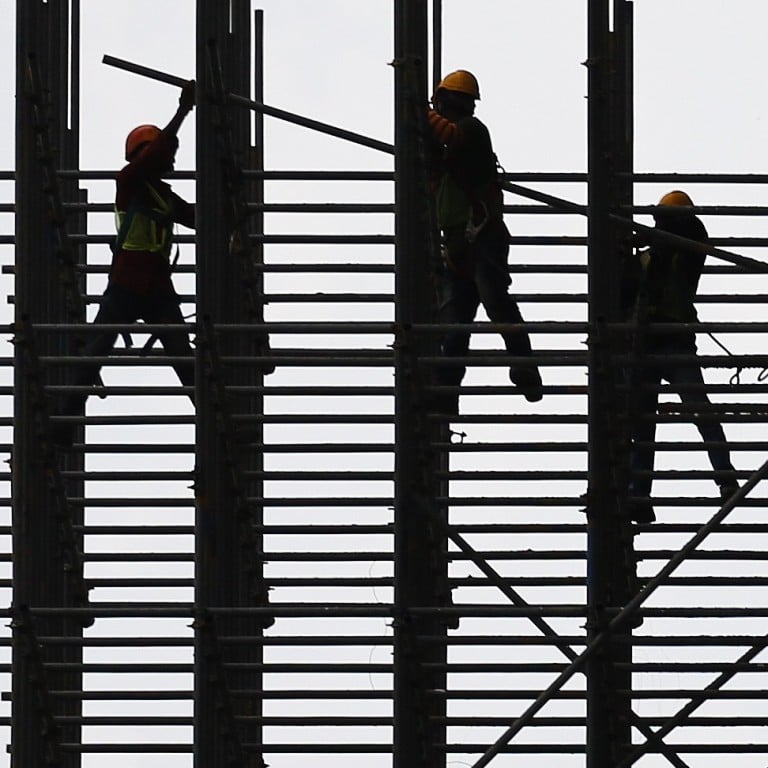
Malaysia to slash migrant workforce amid intolerance, job scam crisis involving Bangladeshi labourers
- Rights groups allege tens of thousands of Bangladeshis have been tricked into coming to Malaysia over non-existent jobs and now face further exploitation
- A ‘drastic reduction’ in migrant worker numbers would cause companies to rush to bring in new labourers, a migrant activist warns
Malaysia will slash the number of low-skilled migrant labour it allows in the coming years, the economy ministry has said, as intolerance grows towards its burgeoning overseas workers amid a job scam crisis across the country’s Bangladeshi labour market.
Brought in during the 1980s to jump-start Malaysia’s economic boom, migrant workers were instrumental in the rapid growth of the country’s gleaming skyscrapers and infrastructure projects.
But they are now being seen by many among the country’s 30 million population as low-paid competition, with Bangladeshi workers in particular becoming an easy scapegoat for social and economic ills, including taking Malaysian jobs, that easily teeter towards xenophobia despite their essential role in building the economy.

Speaking in parliament on Monday, Minister of Economy Rafizi Ramli said Malaysia would set a course for a “drastic and significant reduction” in the number of foreign workers as part of its next five-year plan for 2026 to 2031.
“We need to be committed to reducing the numbers of low-skilled migrant workers in our country,” Rafizi said.
His comments come as rights groups allege tens of thousands of Bangladeshi migrant workers have been brought in under false pretences and now languish in immigration detention centres, or have been forced into seeking jobs illegally to pay off debts to employment agencies in both Malaysia and Bangladesh who tricked them into emigrating.
Since December, Malaysia has seen reports of thousands – possibly tens of thousands – of migrant workers being lured into Malaysia over lucrative job opportunities, only to find out after arriving in the country that the jobs promised are non-existent.
On February 27, a construction company fell under investigation after authorities rescued 93 Bangladeshi migrant workers from a derelict shophouse in Kuala Lumpur, who were brought in by the company under a quota scheme but ended up without work or income.
This came after 171 other Bangladeshi workers in the oil and gas hub town of Pengerang, Johor, marched to a police station to lodge a report against their employers accused of similarly duping them into coming to Malaysia.

Staffing plantations, manufacturing and construction, as well as security and domestic help, there are up to 3.2 million migrant workers in Malaysia, according to research by the World Bank. That includes up to 1.4 million who are deemed “irregular”, who have entered the country with a valid working visa but now work unauthorised, often exposed to the sharp end of labour abuses and job scams.
Rafizi said the National Economic Action Council would start next month to discuss how to wean the country off its addiction to cheap migrant labour.
The government has already capped the intake of new migrant workers to a target of 2.55 million, with a deadline of May 31 set as the last day for employers to bring in new workers into the country.
On Friday, Home Minister Saifuddin Nasution said there were currently 2.13 million migrant workers in active employment in the country based on immigration department records, with a quota of 412,011 new migrant workers opened to fill in the remaining jobs.
“The projection of migrant workers in our country for 2024 can hit the ceiling set by the economic ministry as early as May 31, 2024,” Saifuddin said.
The ceiling figure is based on a formula which sets the maximum number of migrant workers at 15 per cent of the country’s labour force, which stands at 17 million for 2024.
Malaysian police raid against illegal migrant workers fuels ‘xenophobic’ views
The government has also been engaging in a rehiring and repatriation programme for mainly Bangladeshi workers who have paid several thousand dollars to work in Malaysia only to find the jobs do not exist, forcing them into overstaying and risking legal action and further exploitation as they seek new work.
In parliament on Monday, former deputy finance minister Mohd Shahar Abdullah warned that Bangladeshis would dominate Malaysia’s workforce and pose a threat to Malaysian incomes over time – despite only arriving in such large numbers because of unscrupulous Malaysian agents and firms.
“We are no longer competing among Malaysians, but instead with non-citizens who came into our country as unskilled labour but have now grown to be entrepreneurs,” Mohd Shahar said. “Ultimately, the [Bangladeshis] will dominate.”

Amid the rising anti-migrant vitriol, migrant activist Andy Hall warned that slamming the door shut on new arrivals would create a rush for companies to bring in workers.
That is in part to staff future work, as well as to exploit well-worn routes which see Bangladeshi workers pay vast sums to move to non-existent jobs.
“Recruited workers, already so vulnerable, could fall victim again to unscrupulous recruitment intermediaries and unethical recruitment agencies, and become jobless and destitute on arrival,” Hall said.
Home Minister Saifuddin said the government had terminated the services of employment agencies to curb abuse of the system, adding that companies who needed workers should now deal directly with immigration agencies.
“Employers should make full use of this and expedite the process,” the ministry said.
“The ball is in the employer’s court.”

